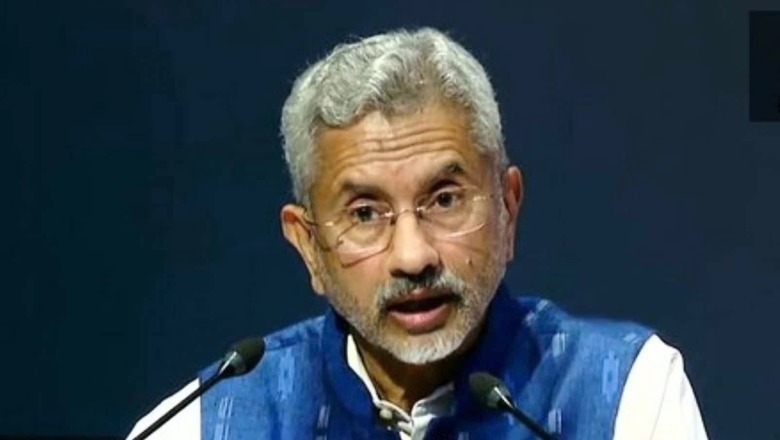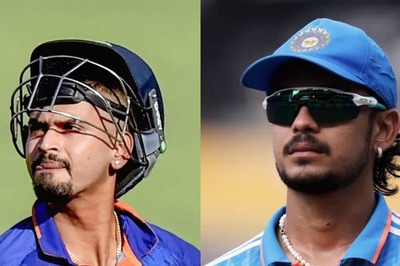
views
External Affairs Minister S Jaishankar on Thursday said people of India want good relations with Pakistan but “good” neighbours don’t carry out terrorist activities.
Speaking at the Hindustan Times Leadership Summit 2022, Jaishankar said the understanding within the government regarding friendly relations with neighbour Pakistan is not different from the public’s expectations. “I sense that the people of this country want a neighbourly relationship with Pakistan. But they want a good neighbourly relationship and good neighbours don’t do terrorism. It is as simple as that,” he said.
The Union Minister discussed India’s relations with China, Pakistan and the United States, the ongoing Ukraine conflict as well plans by the government ahead of Prime Minister Narendra Modi’s visit to the G-20 summit in Bali.
‘Present State of Relations Not in China’s Own Interest’
On India-China relations amid growing concerns over Beijing’s aggressive military posturing along the Line of Actual Control (LAC), the union minister said there are still some issues that need to be worked upon. “India and China have made some progress on some issues keeping in mind equal and mutual security but there are some which still need to be worked upon,” he said.
He said the clash between Indian troops and Chinese PLA in Galwan Valley in Eastern Ladakh in June 2020 was “an attempt by one party to depart from the status quo which is the “heart of the issue.”
“So I think it’s in the nature of what I do that you have to keep pushing. I do genuinely believe that there will be realisation, There should be a realisation that the present state of relations is not even in China’s own interest,” he was quoted as saying.
He further said India maintains good relations with Western countries including the United States, “India’s interests are served well by working closely with Western countries and that feeling is reciprocated by them,” he said.
India-US Relations
Jaishankar said India-US have worked “remarkably” due to close cooperation between the two countries amid changing global scenarios. “My sense of how it has changed over the past few years is that the two countries are strategising how it applies to a world in transformation. Now, obviously, they will look at it from their world view and we from ours… but I think the level of contact and comfort and ability to work together today is remarkable,” he said.
Urgent Necessity to Return to Negotiating Table: EAM on Ukraine Crisis
Speaking on India’s role in the peace process between Russia and Ukraine amid the ongoing military conflict between the two neighbouring countries, the external affairs minister recalled Prime Minister Modi’s appeal to Russian president Vladimir Putin in which he stated “today’s era is not of war” and further said there is an “urgent necessity” for countries to get back to the negotiating table as such issues cannot be settled in battlefield.
“Such countries can see the suffering faced by others who have nothing to do with this issue but become collateral damage. For countries like this it is important to speak up to shape global opinion in a positive direction,” he said.
Prime Minister Modi met Russia’s Putin during the sidelines of the annual summit of the Shanghai Cooperation Organisation (SCO) in Samarkand in September and appealed for cessation of hostilities in Ukraine.
‘Important that G20 remains true to its agenda’
PM Modi is also scheduled to attend the G-20 summit that will be held in Indonesian city of Bali from November 14 to 16. Indonesian President Joko Widodo will symbolically hand over the G20 presidency to Prime Minister Modi at the closing session of the summit. India will formally assume the G20 presidency from December 1.
Speaking on India’s roadmap for the G20 summit, Jaishankar underlined that the gathering is an economic forum and noted thatis it’s important that it remains true to its mandate and agenda.
He said it is likely issues of international law and sovereignty will influence the G20 summit and affirmed the forum is not for settling such issues, adding it is “important that G20 remains true to its agenda.”
Jaishankar also warned against the influence of the big tech companies and manipulation of opinions. “You have around the world people with economic interest, with ideological viewpoints who believe today that it is their power, their right to certify, de-certify, criticise, support, legitimise, de-legitimise. This is an issue,” he said.
‘Globalised Politics’
Discussing the globalisation model, he said it has been more and more challenged since the 2008 global financial crisis and noted the influence of political and economic manifestations. Listing Brexit and election of former US president Donald Trump as political manifestations and “denial” over economic manifestations, he said “There was kind of a globalisation mantra which a lot of people, including in our country, bought into without too much application of mind and too much thinking of our own interest there.”
He noted that globalisation has globalised politics. “When you cannot win inside a country, you export the debate outside. When you cannot get voices inside the country you will call back up from outside. These are all challenges in today’s politics,” he said.
India lacked the vision, desire and sense for competition to take the country forward until the Narendra Modi-led government came to power in 2014. “Where is our competitive sense… that desire to take this nation forward. It was lacking till 2014… there was no vision about where this nation is going. Today, I would say progress is digital delivery of benefits, financial inclusion, idea of actually manufacturing in India.”
‘Atmanirbhar Bharat goal not primitive’
On India’s Atmanrirbhar Bharat initiative, he noted that there is a common worry among all the major economies of the world going through difficult times and said it should be viewed as complications instead. He further said as a solution to that, countries are turning to self-reliance and limiting international exposure in areas where they don’t need it.
He also warned against thinking from the “primitive” ‘globalisation [vs] protectionism’ debate in terms of Indian government’s goals of an Atmanirbhar Bharat or self reliant nation.
Addressing “digital churning” or issues related to data privacy ownership and questions of ‘where is your data’, ‘how is it processed’ and ‘who processes it’, he said: “This is a new era. We need, as a big polity with very large vulnerable sections in this country, to actually see how we safeguard ourselves in a difficult era. How do we build those capabilities in a difficult era. So it is a mindset change, it is a capability change, it is a strategic change.”
Read all the Latest India News here


















Comments
0 comment